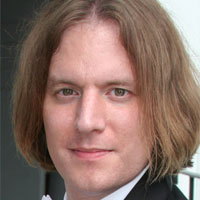Van Davis
Finding The Band On The Milk Carton
The evening of Van Davis' CD release party at the Knitting Factory Tap Room in lower Manhattan was at the height of this summer's East Coast heat wave. Pushing 100 degrees outside where fans escaped for some air or a quick smoke, the temperature inside was hot enough to ensure the venue did record sales at the bar. The metal fans in their leather and denim jackets were probably wondering what the hell they were doing there.
Metal fans at a jazz show? Perhaps they were just there to catch opening act the Alex Skolnick Trio, who Van Davis invited to share the bill that evening, headed by the former lead guitarist for Testament, with whom he recorded five albums and toured the world with the biggest names in the genre. When Skolnick's band finished their scorching set, fans might have ducked out to the street for a few minutes, or hit the bar again for another shot, but no one left.
After Skolnick's set, Van Davis' founder and guitarist, Jake Ezra, hit the stage to begin setting up. It turns out that Skolnick was a huge influence on Ezra's own playing. Ezra even had Skolnick's poster up on his wall while in school. Both players were heavily influenced by Eddie Van Halen, who also provides the first half of the name of Ezra's band. The "Davis" in Van Davis comes from Miles Davis, one of jazz's most visionary and influential performers and composers.
When Van Davis, with Ezra on guitar, Patrick Carmichael on drums and Jon Price on bass, start their headlining set, it's immediately apparent that they live up to the styles of both namesakes, and take the sound in new and exciting directions. Ezra's collection of pedals and effects is used to add stunning color to the music, and his manipulation of the wah pedal is perfect. The rhythm section moves from jazz to blues grooves effortlessly, and touches on a harder rock vibe without missing a beat or making it seem the least bit forced. They are clearly tight and comfortable in their environment.
The New York City-based trio started in 2002 and have played several of Manhattan's best-known live venues, including 55 Bar, Arlene's Grocery, Kenny's Castaways and CBGB. The show at the Knitting Factory Tap Room was to celebrate the release of their new CD, "Have You Seen This Band?," which should be a big step in not only solidifying the band reputation around Manhattan, but breaking them outside of the area as well.
As Van Davis' set was winding down, and the room cooked from the summer heat, fans got in closer and moved along, not wanting to miss a single moment. For a band to hold a room's attention for an hour can be tough enough. To do so when cool drinks and fresh air are calling longingly, is an indication of how compelling the music and the band's performance really are.
Chorus and Verse interviewed Ezra before the show to discuss the band's direction, as well as the new CD. The show at the Knitting Factory clearly met and exceeded his expectations, and it'll be interesting to watch where how far they can take the opportunities that are sure to develop.
Give us a brief tour of your life before moving to New York City in 2002. Where did you grow up, and what are some of your earliest musical memories? When and how did you get your first guitar and begin playing?
I grew up in a very musical family, with my father being a professional musician and my mother a dancer, so the musical seed was planted early. My father started me with piano lessons at age seven, but after seeing Van Halen in concert two years later, guitar became my passion. I begged my folks for a guitar, and at age 12 they finally broke down and got me a black Japanese Fender Squire Strat. After that, I practiced guitar furiously, while still studying piano, although guitar eventually eclipsed my piano playing days, though I still play piano here and there.
Did you move to New York City specifically to pursue a career in music? What were some of the first things that you did after you moved to New York, and what were some of the first breaks that came your way?
I attended William Paterson University where I earned a degree in Music Ed, so I started teaching middle school music soon after I graduated, for about three years. But, I yearned to play so badly that I ended up giving up teaching to pursue a career in performing. I took some time off and regrouped, and around that time I met my beautiful future wife, and she and I decided to move in together in NYC. At first, I began teaching private guitar lessons, but through the help some established players in Manhattan, I found myself subbing in Broadway orchestras, working on shows like The Lion King, Wicked, and Light in the Piazza.
How did the idea of creating a sound "with the rock bravado of Van Halen, and the free musical experimentation of Miles Davis" first form in your mind, and how long did it take you to make a reality out of it? Did people get what you were doing when you first started talking about it?
I always wanted to do an instrumental group, but it was hard to keep the music from getting too jazzy and heady, or too rock and just playing speed licks up and down the guitar neck all day. I wanted to create music that was challenging and fun, but also enjoyable for the listener.
The Van Halen influence is pretty obvious in our music, but the Miles Davis name comes more from his later years when he started exploring funk and fusion styles, which he got a lot of flack for. I really admired him for that, for making music that was very different from his past efforts, very angry and potent stuff. You can feel the emotion when you listen to those records.
When I first presented the idea to friends and other musicians, they thought I was off my rocker, and said that audiences wouldn't get it. And, for a while, they didn't. With this new release, I feel like now they'll get it!
How did you find Patrick Carmichael and Jon Price and get them to join you in forming Van Davis? Did they help create the sound that you were looking for originally, or did the result turn into something unexpectedly different?
Patrick was a big part of why I put this group together in the first place. Patrick and I played together in a few pick-up groups, and I knew once I heard him I wanted to have him involved with this project. We got together and played with a handful of bassists, but it was difficult to find someone with a unique approach to playing that we were striving for. Patrick brought in Jon Price to a rehearsal one day, and he literally played a few bars with us and I was sold! He really complements the sound of the band, and he's made this crazy trio into something very interesting and exciting. People who hear us are always surprised that's it's just the three of us onstage, because of all the sound we make.
Let's switch to the new CD, "Have You Seen This Band?" How long have you been working on the album, when and where was it recorded and is there anyone outside the band who deserves some credit for helping to make it happen?
I've been working on this record for over a year, and it's been a long and often frustrating journey. But, like I hear many recording musicians say, with each record you create you learn something new and valuable, and I certainly can attest to that! We recorded the music at a number of locations: Benny's Wash and Dry in Brooklyn, Studio X in Ridgewood, NJ, and a new studio in Clifton, NJ called Redemption Studios. The reason for this is [that] each track has its own sound and atmosphere. However, this causes some trouble when it comes time to mixing the final product. The music needs to stay consistent ... even when listening to the CD in its entirety, so that nothing is too loud or too soft and the listener doesn't have to reach for the volume knob from track to track. For this, I give credit to Rave Tesar, who recorded three tracks for the disc and did a tremendous job mixing and mastering the disc. I also would like to give credit to Rob Fillmore, who worked with the band on recording additional tracks and overdubs, as well as recording our live performances and being instrumental in making this CD happen.
How were the ten tracks on the CD composed? Does the band like to try out material live on stage, or is everything worked-out and finalized in the studio before it's done live?
Whenever I write a new song, I create a chart, or musical road map of the structure, and give copies to the band and myself as well, and we rehearse it through. We'll work out any kinks in the music during rehearsal, and then we'll try it out live. We don't over-rehearse the music because it's fun to keep it fresh, and it evolves as we perform it more. Playing new tunes live for the first time is a real thrill, because when you add an audience to the mix that will greatly effect the performance and, if you're lucky, something exciting and unique emerges from the music. Eddie Van Halen called it "falling down the stairs and landing on your feet!"
On the CD, a good amount of the music was worked out and perfected in the studio to keep things organized but, along with that, there is a good amount of improvisation on the record, and everyone gets a chance to shine.
All of the band members contributed material to the album, which you've said is a point of pride. How does the collaborative process work within the band and how long from when you started playing together did it take for that trust to develop?
When Patrick and I first started working together, he gave me a CD of his music titled "Flea Circus," and my favorite track on that disc was "Monkey Chips". I thought it was a perfect song for Van Davis to perform and, since then, it's been a crowd favorite. I really enjoy Patrick's songs because they're very different from my writing style and they give the band some variety. Once Jon joined the group, I asked him if he had any material and he presented "Crunchy Funk," which we immediately took to. It's a fairly difficult song and it took some time to get it right, but now it's become a staple in our sets. It's always fun to play because you never know what it's going to be like each night!
Steely Dan's Ted Baker contributes keyboards as a special guest on two of the new album's tracks. How do you know Ted and how did his participation in the album come about?
Ted is the primary keyboardist in the Lion King orchestra, so we've played together very frequently. One night after a rousing rendition of "Hakuna Matata," Ted asked me if he could sit in with Van Davis sometime, so I graciously accepted his offer and he ended up sitting in with us at the 55 Bar at a few shows. [It] was a real treat. When it came time for us to record our disc, I invited Ted to play on a few tracks and they came out great! Ted still sits in with us frequently at the 55 Bar.
Also, on a personal note, I've always dreamt of playing guitar with Steely Dan and having Ted work with us and contribute keyboards to our music is an honor, considering how much I admired his playing on "2 Against Nature," the first studio album Steely Dan made in 20 years.
How much improvisation usually takes place during a Van Davis show? When someone hears the new CD performed and then listens to the disc itself, do you think they'll hear significant differences? Do you consider your songs to be finished products that should basically be heard as they are, or just a framework to work within?
There is a fair amount of improvisation at our live gigs but, at the same time, the songs are very structured and planned out because the songs I wrote are more composed with contrasting musical sections sewn together, as opposed to Patrick's songs which are a more standard jazz head form with a melody, and then solos over the form.
I think the CD documents the evolution of where the band has gone since it began almost four years ago. Hearing the entire CD performed live will definitely sound similar to the disc, but live we're always throwing curve balls at each other and having musical dialogues, especially when the audience reacts to our musical experimentation.
I never view our songs as totally finished. I always encourage the band to take chances and try something new. Almost every song we perform has a section where there are solos and improvised parts, but we tend to rehearse some of the trickier parts here and there just so we don't forget them!
Why was the The Knitting Factory Tap Bar chosen to host your CD release party on July 23rd? Do you feel excited or nervous about finally being able to put the CD out there, or do you feel that it's about time and want to use it to move on to other opportunities?
I chose the Knitting Factory because we've played some really great gigs there, and the Knit has always been a place where all musical styles are welcome, including non-musical forums like film and poetry. Plus, the Tap Bar is a really beautiful room, and it'll be fun for us to play out and let the music take us to new places. We're very excited about presenting some new music for our fans, as well as hopefully making new ones in the process, and the CD will be a great calling card for those who may not be familiar with what we do.
You've asked trios fronted by Alex Skolnick and Oz Noy to share the bill with you at The Knitting Factory. Can you share a bit about these two performers and why you wanted them to be a part of this evening with you?
I've shared bills with both of those trios individually and I thought that having them on the bill would make the night a complete evening of guitar music. The styles of each group are unique, so I know whoever comes to hear a specific band will dig the others on the bill. Being a Testament fan in my earlier years, Alex was a big influence through my formative years on guitar, so it seemed fitting to have his trio join us again. Oz is also a fantastic player who's been making some great music and his tone, especially, is like no one I've ever heard before. On the 23rd, he'll be performing in an organ trio setting, which will be a very interesting change from his usual drum/bass lineup.
What are the band's plans once the CD has been officially released? What do you anticipate are your next steps and are there any other upcoming projects that you'd like fans to watch out for?
After the disc is released, we'll be doing some touring to start promoting the disc and get more people turned on to our music. We try to make our music sound like a roller coaster, with unsuspecting twists and turns that'll catch a listener's ear and keep them guessing where we'll go next. That's why we do it, to make people feel good with our music.
Van Davis is also involved with a unique theatrical show/concert titled "The Band Behind the Curtain," which is a modern adaptation of the Wizard of Oz and Alice in Wonderland. Van Davis's music is the soundtrack and we are featured onstage along with the actors. It's a very interesting and enjoyable piece. We'll be performing this at non-conventional theater venues in the near future, so keep checking our website (www.vandavis.com) for updates.
[ Website: www.vandavis.com ]

Matt Mrowicki founded Chorus and Verse in 2001. He is a rock star designer and technologist, Internet professional, content creator, and entrepreneur specializing in web development, IT consulting, branding, social media and online marketing. www.imprtech.com









